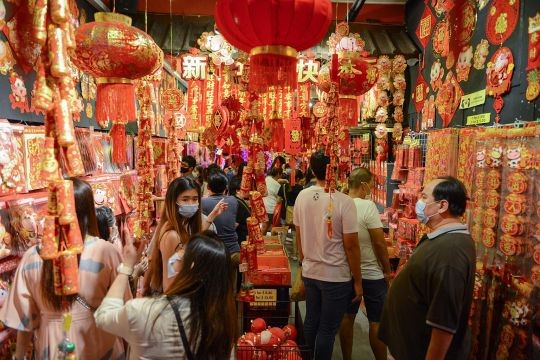New Covid-19 rules: Maximum 8 visitors per day, yusheng tradition to be silent this Chinese New Year


SINGAPORE - From next Tuesday (Jan 26), each household will be allowed to receive up to only eight unique visitors a day, said Education Minister Lawrence Wong on Friday.
Individuals should also limit themselves to visiting at most two other households a day, as far as possible.
During the Chinese New Year period, people should visit family members only, he added. The tightened measures come on the back of rising community cases after the year-end festivities.
"With more interactions, with more human activities, there is an increased chance of transmission of any infectious disease," said Mr Wong, who co-chairs the multi-ministry task force tackling the Covid-19 pandemic. "Compared to a month ago, our vulnerability has increased, and the situation can escalate very quickly, especially with the likelihood of more interactions taking place over the Chinese New Year period."
Although people will still be allowed to gather outside in groups of up to eight, he stressed that Singaporeans should keep their social circles small.
Mr Wong also reminded diners that face masks must be worn when not eating or drinking, adding that voices should not be raised at any time.
This means that masks must be worn while tossing the traditional yusheng, with no recitation of the usual auspicious phrases that are said at the time.
Enforcement checks will be stepped up during this period, with strict action taken against individuals and business operators that breach safe management measures, he said.
He noted that the virus is still raging around the world. Places that have been successful in controlling the infection up until now - such as Taiwan and Hong Kong - are also imposing restrictions on Chinese New Year celebrations, he said.
Mr Wong also recounted how Singapore saw a spike in Covid-19 cases after Chinese New Year last year, with multiple clusters linked to such gatherings.
[[nid:516393]]
That is why the task force is making a pre-emptive move to tighten measures to avoid a repeat of what happened last year, he said.
"Let us be mentally prepared that Chinese New Year this year will not be the same as before," he added. "It will be quieter, it will be more subdued, and we will have to be more disciplined in how we go about our daily activities and interactions."
He stressed that the underlying principle behind the measures is for people to reduce exposure to one another.
A surveillance testing exercise will also be carried out for stallholders, shop owners, restaurant workers and food delivery workers operating in and around Chinatown, said the ministry.
The two-day exercise will start on Feb 8, with the authorities planning to progressively contact identified groups with further details.
"While there has been no evidence that these community groups are at higher risk of infection, the Ministry of Health (MOH) will be offering tests to them, as they are expected to interact more frequently with other members of the public during this time," MOH said in a statement.
The Government will fully bear the costs of these tests, it added. "We strongly encourage all individuals in the identified community groups to come forward for testing."
For the latest updates on the coronavirus, visit here.
This article was first published in The Straits Times. Permission required for reproduction.